The many vicissitudes of the UNP
By Jaliya WIJEYEKOON
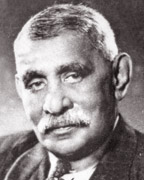 |
|
D.S. Senanayake |
All democratic political parties, not only in Sri Lanka, but in other
countries too, have experienced ups and downs during their existence.
The first registered political party in Sri Lanka is the Lanka Sama
Samja Party which was founded by the Late Dr. N.M. Perera and his
colleague. It soon took root in the country since Dr. Perera managed to
indoctrinate his political philosophy to the down-trodden masses.
The United National Party (UNP) was formed by D.S. Senanayake in
1946; he enjoyed the support of all community leaders of the State
Council who represented the Ceylon National Congress.
The name 'United National Party' was chosen for this new political
party since all community leaders of the State Council were united and
unconditionally supported D.S. Senanayake.
The progressive measures taken by the United National Party for
agricultural development, inter communal harmony and mostly for the
independence and sovereignty of the nation proved to be very successful.
The island's first general election was held under the Soulbury
Constitution in 1947 and D.S. Senanayeke elected Prime Minister under
the United National Party banner.
Many disagreements
The country's most significant achievement under the first UNP regime
was gaining independence on February 4, 1948 from the colonial bondage
of over 13 decades.
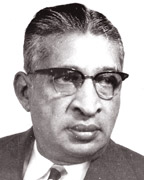 |
|
Dudley Senanayake |
The United national Party became firmly rooted in the country due to
its development activities while the Lanka Sama Samaja Party (LSSP)
Leader Dr. N.M. Perera functioned as the first Opposition Leader,
instigating the working class people to revolt against all progressive
activities of the government.
The LSSP established themselves in certain areas of the country,
especially in the Sabaragamuwa Province in which Dr. Perera launched his
Marxist political movement.
D.S. Senanayake passed away in 1951, after a fall from his horse
while on his regular exercises at Galle Face Green. His eldest son,
Dudley Senanayake, who was the Minister of Agriculture then, was
appointed by Lord Soulbury as Prime Minister over an understanding he
had with D.S. Senanayake.
Sir John Kotelawala was not very happy with this arrangement and had
disagreements with Dudley Senanayake on various issues.
Dudley Senanayake, a Cambridge scholar and a mild mannered
politician, immediately dissolved the Parliament and went for an
election. The UNP recorded a convincing victory, obtaining over a
two-third majority under the leadership of Dudley Senanayake. By this
time, the UNP had consolidated its position in all parts of the country.
Dudley Senanayake continued for two more years and faced many
confrontations with Sir John Kotalawala who was anxiously eyeing the
Premiership.
S.W.R.D. Bandaranaike, who was the then Leader of the House, broke
away from the United national Party and formed the Sri Lanka Freedom
Party(SLFP) which rapidly gained ground in the political arena with his
political ideology which correctly mobilised the five forces, viz.
Buddhist priests, native physicians, teachers, farmers and manual
workers.
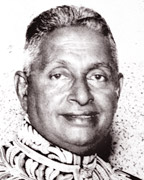 |
|
Sir John Kotelawala |
Dudley Senanayake's health deteriorated with an unending stream of
problems and he stepped down from the leadership and retired from
politics, paving the way for Sir John to take over the reigns of the
party and the country.
Sir John Kotelawala, a militant personality and a rigid and stubborn
administrator, confronted everybody who opposed him including the
Mahasangha. The UNP membership was not happy with the way he ruled the
country and the government, under Sir John's leadership, became
unpopular even before the completion of the Parliamentary term. A
general election was held in 1956 and the UNP was reduced to a mere
eight members in the house. The SLFP-led coalition formed a government
under the able leadership of S.W.R.D. Bandaranaike.
Bandaranaike made Sinhala the official language within 24 hours
amidst objections from various quarters and restructured a number of
institutions based on his political ideology. Some of Bandaranaike's
policies were vehemently criticised by the Opposition which claimed that
he was adopting an anti-imperialist stand which would result in
offending the friendly Western nations.
Political landscape
With the passage of time, governments changed from term to term,
between the UNP and SLFP-led coalitions until 1977 when J.R. Jayawardene
completely revolutionised the political landscape of Sri Lanka with the
introduction of the Executive Presidency and the preferential voting
system for all elections.
Jayewardene was an astute politician with an ocean of knowledge in
all spheres of ruling the state. Past election records had proved that
the UNP vote base had remained almost intact, even at the worst defeats
suffered by the party. Hence, the introduction of the system would help
the UNP to remain in power continuously.
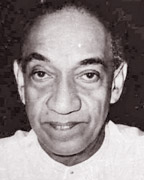 |
|
J.R. Jayawardene |
As expected by Jayewardene, everything was perfectly al right during
his tenure as far as the subsequent elections were concerned. President
Jayewardene also had a number of able lieutenants under his wings on
whom he entrusted mega development projects, administrative functions
party development activities, international affairs and even trade union
activities.
None of his subordinates challenged him on any of his programs. The
one and only minister who disagreed with him was Gamini Jayasuriya who
opposed the Indo-Lanka Peace Accord and stepped down from his
Ministerial portfolio on this basis and retired from politics.
J.R.J. retired from politics after completing his two terms and his
term of office goes down in Sri Lanka's history as one of the most
progressive periods in respect of socio-economic development in the
country. The United National Party was well consolidated with its
political activities and all other Opposition parties, including the
SLFP, were virtually driven to political doldrums.
SLFP leader, Sirimavo Bandaranaike's leadership was challenged by her
son Anura Bandaranaike and the party had disintegrated into a number of
factions, such as the Anura group, Sirima group Maitripala group and
Kobbekaduwa group. A number of small parties were aligned with these
different groups from time to time. A new party was formed by Chandrika
and Vijaya Kumaratunga along with some leftaway parties; it was named
Mahajana Pakshaya and was formed to challenge the Anura group.
After President Jayawardene retired from politics, Ranasinghe
Premadasa became the President and the leader of the United National
Party.
Political blunder
Although President Premadasa was an experienced and practical
politician, he made a political blunder by side lining stalwarts such as
Lalith Athulathmudali, Gamini Dissanayake and G.M. Premachandra. They
joined hands with the Opposition and brought an impeachment motion
against President Premadasa.
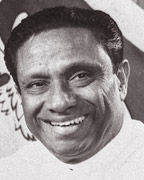 |
|
Ranasinghe Premadasa |
However, Premadasa managed to weather the political storm though it
was the beginning of the collapse of the hitherto well consolidated
United National Party.
Ranil Wickremesinghe was the Minister of Science and Industries in
the Premadasa Cabinet and he fully supported his leader when his
position was challenged by the breakaway group. Wickremesinghe always
stood by his leader, following the democratic principles of politics. He
was also persuaded by the breakaway group to join them, but he turned
down this request since he was a true loyalist and committed democrat.
President Premadasa was assassinated on May 1, 1993 by the LTTE and
the then Prime Minister D.B. Wijethunga was elected President by the
party. It was admirable to see how Wickremesinghe handled the transition
of power from behind the curtain, without letting the unruly masses
create a chaotic situation in the country.
However, the United National Party experienced a gloomy period in its
history, mainly owing to LTTE terrorism, losing most of its prominent
leaders within a span of less than two years, and the entire grass roots
level membership remained crest fallen.
By this time, the SLFP had received a new lease of life with
Chandrika Kumaratunga taking centre stage in politics and the United
National Party, which had remained in power for 17 long years, lost the
1994 general election. President Kumaratunga completed her two terms
amidst many political hicups, but the SLFP managed to re-establish its
vote base islandwide fairly successfully.
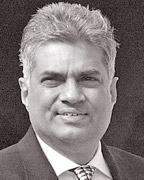 |
|
Ranil Wickremesinghe |
Mahinda Rajapaksa managed to scrape through to the Presidency at the
2005 elections with a marginal majority. However, as a patient and
experienced politician, he consolidated his position and defeated the
long-drawn LTTE terrorism admirably, which helped him win his second
term quite comfortably. The entire social fabric remained in total
disarray for over two decades due to the LTTE menace and the moderate
voter, irrespective of party differences, voted President Rajapaksa to
continue for a further term.
Consecutive defeats
With the consecutive defeats suffered by the UNP, Wickremesinghe's
leadership in the party was challenged by Hambantota district
Parliamentarian Sajith Premadasa who wanted amendments to the party
Constitution.
His campaign against the leadership gathered momentum and a handful
of young vociferous, inexperienced and impatient Parliamentarians and
provincial councillors rallied round him with the intention of ousting
Wickremesinghe from the leadership.
However, at the Working Committee meeting, Premadasa settled down for
the Co-Deputy Leader's post in the party along with Karu Jayasuriya to
the utter dismay and disappointment of his reformist group members.
Dayasiri Jayasekera then made a public statement that he would not back
anybody to be the leader in future and would only work for the
betterment of the party.
The leadership tussle was suppressed for a short period and flared up
once again after the last Local Government election results.
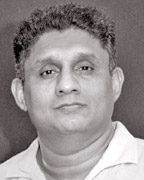 |
|
Sajith Premadasa |
Jayasuriya, who had accompanied 17 UNP members and crossed over to
the Government and returned to the party empty-handed was again welcomed
by the party hierarchy in keeping with his political maturity and
democratic policies. Jayasuriya was even re-appointed Deputy Leader.
Reformist group members headed by Premadasa then promoted Jayasuriya to
contest the leadership. Jayasuriya immediately launched a campaign with
the support of some bhikkhus and some members in the reformist group.
With the promulgation of results of the election for these top posts,
Siri Kotha, the UNP party headquarters were attacked by goons, supposed
to be the followers of the reformists.
No UNP would have ever endorsed this type of savage, uncouth and
barbaric acts and the entire grass roots level membership is now
extremely disappointed and unreservedly expect party leader Ranil
Wickremesinghe to take disciplinary action against anybody and everybody
who was directly or indirectly involved in this dastardly act which has
tarnished the image of the beloved Grand Old Party.
Main allegation
The main allegation of the reformist group members is that the reason
for the consecutive defeat of the party at elections is the leadership
of Ranil Wickremesinghe. They claim that with a change in leadership the
party would bounce back to power. These foolish utterances are made by
inexperienced unpractical and short-sighted politicians who have no deep
understanding of the ground realities of the political arena.
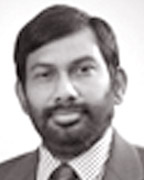 |
|
Daya Gamage |
The need of the hour is not to blame each other or find fault with
anybody over lapses which had occurred in the past. It is doubtful
whether the main Opposition party is interested in winning power even at
a future election at the rate unfortunate things take place in the party
mechanism. Now that the party's top positions have been filled,
everybody should unite, shedding all differences aside and work for
future victory of the party.
The UNP grass roots level membership has requested the reformist
group members to extend their cooperation to the party leadership and
launch an aggressive campaign against the ruling party.
Newly elected national Organiser Daya Gamage is confident of the
party's future prospects. He expects to go right round the country and
reunite all disintegrated fractions in the party to ensure a future
victory.
With such courageous statements made by the UNP leaders, grass roots
level membership is reminded of how J.R. Jayawardene mobilised the
masses, amidst severe resistance from Sirimavo Bandaranaike's government
in the late seventies.
It is no doubt, members believe, an uphill task, but with the correct
approach and positive thinking maintaining strict discipline among the
party leaders and with a solid, effective and viable program, achieving
victory at a future election will not be difficult as the United
National Party is hydra-headed.
|

